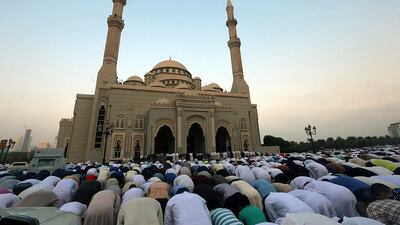Worshippers were out in force across the country early on Monday to mark the start of Eid Al Adha.
In Sharjah, the morning rush got off to an early start as thousands of people hurried to mosques for 6am prayers.
Men, women and children – all with prayer mat in hand – walked up to two kilometres to get to the Al Noor Mosque, which can accommodate more than 1,800 people.
While the early arrivals were praying, thousands more were laying down their mats around the mosque, extending as far as Al Nakheel Park.
Some even laid their mats on the road and prayed in front of the mosque.
“It’s a tradition in our family that all members go to the mosque for Eid prayers before we start this joyful time and enjoy our long holiday,” said Ragheb Mohammed, a 27-year-old Egyptian architect, who was at the mosque with his wife, two brothers and three children.
“My brothers came from Ajman, and will spend the day with us. We will have breakfast and then go to the Sharjah animal market to buy our sacrificial goat.
“In the evening, we start visiting our relatives and friends and have a good time, while the children enjoy their Eid gifts and new clothes, and play with their cousins.”
Ahmed Naeem, a 44-year-old Syrian, barely made it to the mosque in time for morning prayers. He said he would be spending the holiday with his family in Fujairah.
“We spend the first day visiting family members and friends here in Sharjah.
“Tomorrow morning, we will be driving to Fujairah for a couple of days,” he said. “We will then visit friends in Ras Al Khaimah before spending the rest of the break in Sharjah.”
For Sama Al Ramahi, a 32-year-old Jordanian housewife, this Eid Al Adha will be spent with her children because her husband is on a Haj pilgrimage in Saudi Arabia.
“This year, I will be taking my 10-year-old son Ahmed, and his younger brother to the malls in the mornings and to the parks, when the temperature cools down a bit, until my husband returns from the Haj,” she said.
“Our relatives and friends will come and congratulate my husband for performing the Haj.”
Elsewhere in the UAE, people were embracing the spirit of sacrifice and giving, with thousands of residents visiting abattoirs to sacrifice an animal and distribute the meat among family, friends and those in need.
“Eid is about family and charity. We spend many days preparing for it to include each member of the family and keep the traditions alive,” said Jamila Al Qasimi, a 41-year-old Fujairah resident.
“On the first day of Eid and after Eid prayers, men leave for the slaughterhouses to bring meat from the sacrifice, while we stay home to prepare the welcoming sweets and drinks for Eid greeters,” she said.
During Eid, the faithful travel across the Emirates to share the celebrations of their families and friends.
“I have two brothers living in Sharjah and one in Abu Dhabi,” said Ms Al Qasimi.
“We all gather on the first day of Eid at our parents’ house in Fujairah, where our mother cooks for us the first Eid meal with the sacrificial meat.
“We eat some of the meat and the rest goes to relatives and poor people.”
Sheikha Ali, a 38-year-old Fujairah resident, has six brothers and she received a large amount of sacrificial meat from them on the first day of Eid, as each brother sacrificed a sheep.
“I prefer to distribute all the meat that I receive from the family to people in need, as Eid is a celebration of giving,” she said.
“It’s something that we should keep and teach our children about. Traditions may change but the spirit of giving will always be there.”
Salah Mustafa, a 32-year-old Egyptian resident of Fujairah, sends money to his family in Egypt for Eid every year for them to buy meat.
“It’s part of the tradition and the Islamic religion. I don’t have any family members here so I send the cost of the sacrificed animal to my brother back home to buy one and share the meat with other family members and relatives,” he said.
tzriqat@thenational.ae
rhaza@thenational.ae

